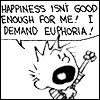How We Feel Linked To Both Our Culture And How We Behave
Scientists have long been interested in the interplay of emotions and identity, and some have recently focused on cultural identity. One's heritage would seem to be especially stable and impervious to change, simply because it's been passed down generation after generation and is deeply ingrained in the collective psyche. But how deeply, exactly?
Psychologists Claire Ashton-James of the University of British Columbia, William W. Maddux from INSEAD, Adam Galinsky of Northwestern University, and Tanya Chartrand from Duke University decided to explore this intriguing question in the laboratory, to see if even something as potent as culture might be tied to normal mood swings. European cultures are known to value independence and individuality, whereas Asian cultures prize community and harmony. This fundamental East-West cultural difference is well established, and so offered the researchers an ideal test.
The volunteers consisted of students hailing from a number of different countries and the researchers unconsciously raised or lowered their moods via two different methods. In one study, the volunteers listened to some upbeat Mozart on the stereo to lift their moods, or some Rachmaninov to bring them down. In another study, the volunteers held pens in their mouths: Some held the pen with their teeth, which basically forces the face into a smile, which improves mood. Others held the pen with their lips, forcing a frown. Then the volunteers completed a variety of tests, each designed to measure the strength of their values. In one test, the volunteers were offered a choice of five pens, four blue and one red. In keeping with cultural values, Asians typically pick from the more common blue pens in this test — to be part of the group — while Westerners usually take the one red pen. In another test, the volunteers thought about the questions "Who am I?" and listed 20 answers. The lists were analyzed to see if they reflected predominantly individualistic or predominantly group values.
The results, published in Psychological Science, a journal of the Association for Psychological Science, were consistent for all of the tests: Feeling good did indeed encourage the volunteers — both European and Asian — to explore values that are inconsistent with their cultural norms. And elevated mood even shaped behavior, allowing volunteers to act "out of character." These findings suggest that people in an upbeat mood are more exploratory and daring in attitude — and therefore more apt to break from cultural stereotype. That is, Asians act more independently than usual, and Europeans are more cooperative. Feeling bad did the opposite: It reinforced traditional cultural stereotypes and constrained both Western and Eastern thinking about the world.
The researchers note these results suggest that emotions may serve an important social purpose. They surmise that positive feelings may send a signal that it's safe to broaden one's view of the world — and to explore novel notions of one's self. The researchers go on to indicate that negative feelings may do the opposite: They may send a signal that it's time to circle the wagons and stick with the "tried and true." They conclude that the findings also suggest that the "self" may not be as robust and static as we like to believe and that the self may be dynamic, constructed again and again from one's situation, heritage and mood.
Journal reference: * * *
1.Ashton-James et al. Who I Am Depends on How I Feel: The Role of Affect in the Expression of Culture. Psychological Science, 2009; 20 (3): 340 DOI: 10.1111/j.1467-9280.2009.02299.x
HOME
The Good Drug Guide
mental health in the third millenniumRefs
and further reading
Happiness
Happiness 101
Are You Happy?
Superhappiness?
Happiness Primer
The End Of Suffering
Television and Mood
Moderate Happiness
Breeding Happy Rats
Happiness and Choice
Hardwired Happiness?
The Abolitionist Project
The Pursuit of Happiness
The Science of Happiness?
Is Happiness Contagious?
Can Money Buy Happiness?
Depression and Chronic Pain
Quotations About Happiness
Health, Wealth and Happiness
The Futile Pursuit of Happiness?
The Happiest Man In The World?
Happiness and Modern Medicine
Can People Be Too Happy? (PDF)
Big Pharma and Madison Avenue
Happiness and Life Circumstances
Happiness: the Recipe for Success
Happiness: A Psychiatric Disorder?
Happiness: a Buddhist Perspective
Are children the recipe for (un)happiness?
Happy Images Make Depressed People Sad
Happiness, Homeostasis and The Hedonic Treadmill
Are SSRI antidepressants little better than placebos?
Are Caring Men Are Happier Than Traditional 'Macho' Men?
Do other people know more about what will make us happy than we do?

